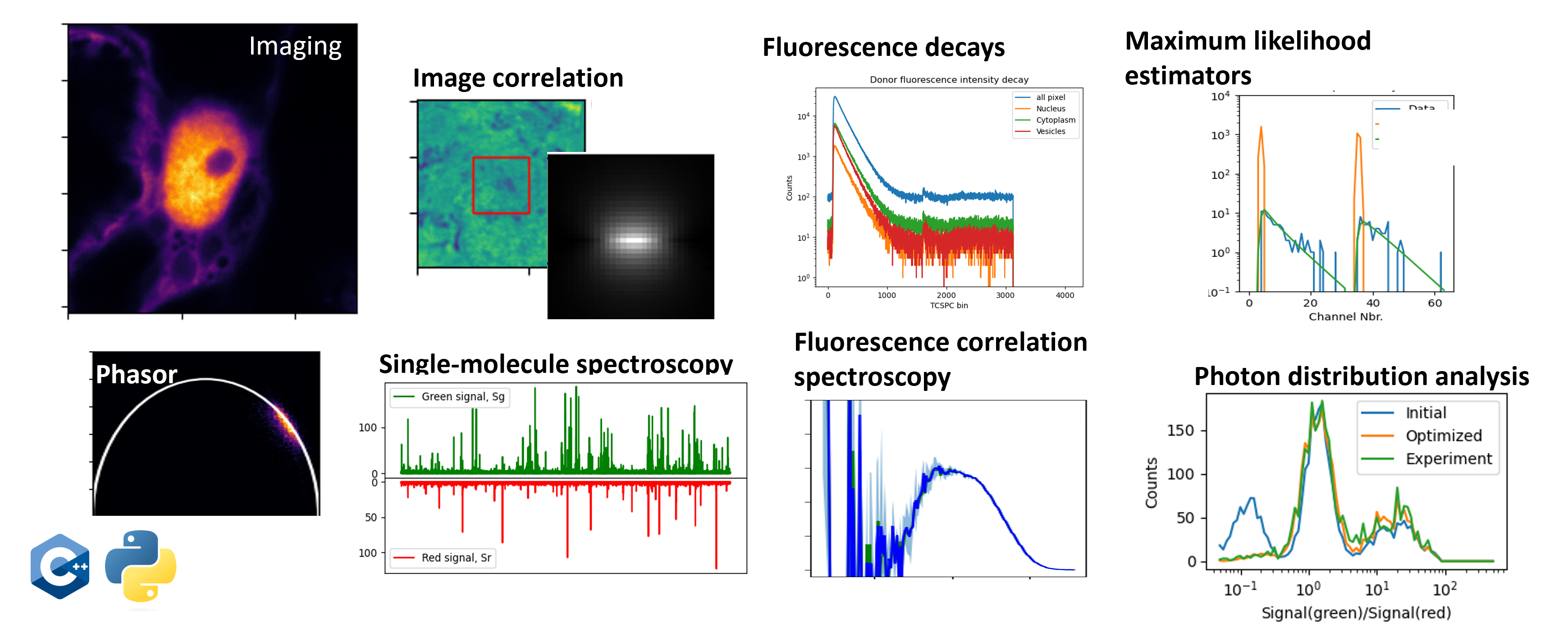General description
tttrlib is a file format agnostic high performance library to read, process, and write time-tagged-time resolved (TTTR) data acquired by PicoQuant (PQ) and Becker & Hickl measurement devices/cards or TTTR files in the open Photon-HDF format.
The library facilitates the work with files containing time-tagged time resolved photon streams by providing a vendor independent C++ application programming interface (API) for TTTR files that is wrapped by SWIG (Simplified Wrapper and Interface Generator) for common scripting languages as Python as target languages and non-scripting languages such as C# and Java including Octave, Scilab and R. Currently, tttrlib is wrapped for the use in Python.
- Multi-dimensional histograms
- Correlation analysis
- Time-window analysis
- Photon distribution anaylsis
- FLIM image generation and analysis

tttrlib is programmed in C++ and wrapped for python. Thus, it can be used to integrate time-resolved data into advanced data analysis pipelines.
Capabilities
- Fast reading TTTR files (IO limited)
- Generation / analysis of fluorescence decays
- Time window analysis
- Correlation of time event traces
- Filtering of time event traces to generate instrument response functions for fluorescence decays analysis without the need of independent measurements..
- Fast photon distribution analysis
- Fast selection of photons from a photon stream
Generation of fluorescence decay histograms tttrlib outperforms pure numpy and Python based libraries by a factor of ~40.
Documentation
Installation
In an anaconda environment the library can be installed by the following command:
Alternatively, you can use pip to install tttrlib
Usage
The API of tttrlib as well as some use cases are documented on its web page. Below you find a small selection of code snippets.
Access photon data as follows:
Print header-information:
Correlate photon streams:
Create intensity images from CLSM data:
tttrlib is in active development. In case you notice unusual behaviour do not hesitate to contact the authors.
Supported file formats
PicoQuant (PQ)
- PicoHarp ptu, T2/T3
- HydraHarp ptu, T2/T3
- HydraHarp ht3, PTU
Becker & Hickl (BH)
- spc132
- spc630 (256 & 4096 mode)
Photon HDF5
Design goals
- Low memory footprint (keep objective large datasets, e.g., FLIM in memory).
- Platform independent C/C++ library with interfaces for scripting libraries
Building and Installation
C++ shared library
The C++ shared library can be installed from source with cmake:
On Linux you can build and install a package instead:
Python bindings
The Python bindings can be either be installed by downloading and compiling the source code or by using a precompiled distribution for Python anaconda environment.
The following commands can be used to download and compile the source code:
In an anaconda environment the library can be installed by the following command:
For most users, the latter approach is recommended. Currently, pre-compiled packages for the anaconda distribution system are available for Windows (x86), Linux (x86, ARM64, PPCle), and macOS (x86). Precompiled libary are linked against conda-forge HDF5 & Boost. Thus, the use of miniforge is recommended.
Legacy 32-bit platforms and versions of programming languages, e.g., Python 2.7 are not supported.
License
Copyright 2007-2024 tttrlib developers. Licensed under the BSD-3-Clause